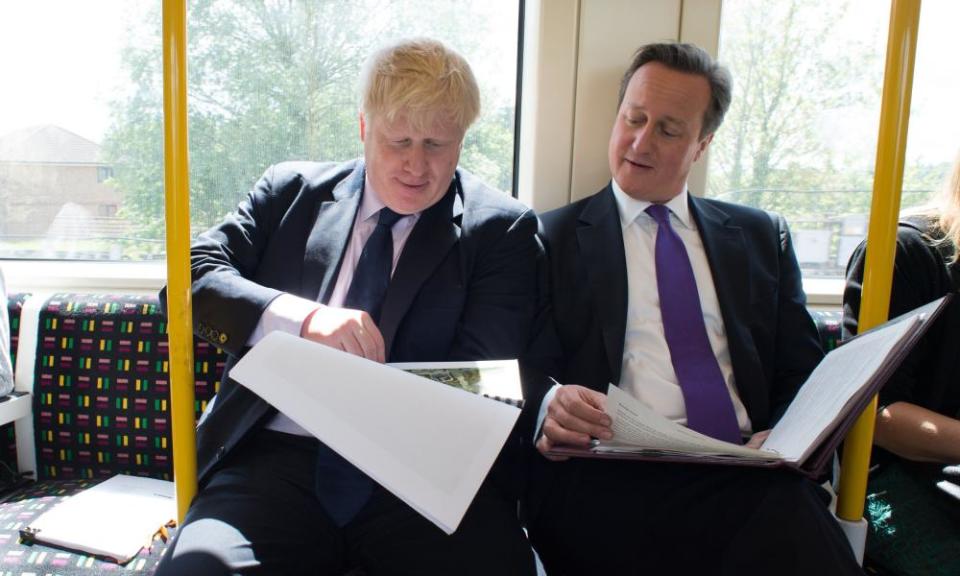Cameron passed a lobbying act, but it was never meant to curb corruption

Nothing should surprise us in the outright dishonesty of Boris Johnson’s Commons replies. But on Wednesday at PMQs, caught in the deepening glue trap of sleaze, he tried lashing out at Labour for voting against the 2014 lobbying act and campaigning to abolish it in its 2019 manifesto.
Indeed Labour did, for very good reasons, as the BBC’s Reality Check justly reported. To clean up politics, Labour’s manifesto promised a new act, with a lobbying register covering business contacts with all senior government employees, not just ministers. MPs would be prevented from taking paid second jobs, and the toothless advisory committee on business appointments would be replaced with a powerful watchdog against corrupt revolving doors between government and paid lobbyists. How different that would be from the rotten 2014 act that ministers struggled to defend in the Commons.
Everyone has enjoyed the reruns of David Cameron’s long-ago excoriation of lobbying, as “the next big scandal waiting to happen”, only to be caught soliciting taxpayers’ cash for a failing financier, in which he held shares worth reportedly tens of millions. Despite the stench, the reason his cash for influence is legal is because he designed himself a fine loophole to the 2014 act: it required “consultant lobbyists” to register but left those in-house untouched, meaning it only covered only 4% of all lobbyists, Transparency International found in 2015. On leaving office, Margaret Thatcher had signed up as a consultant to Philip Morris advising on avoiding tobacco restrictions, for $500,000 a year for three years. The act would no more have stopped her than it did Cameron.
The lobbying act was not aimed at business and politicians at all. Its whole purpose was to silence charities, voluntary organisations and trade unions in the run-up to elections. Why on earth were the Lib Dems such passionate supporters of this gagging act in the coalition government? Because they lived in terror of the National Union of Students mounting a mighty election campaign against Nick Clegg’s U-turn on student fees. The act clamped down on charities and unions running any campaigns that might sway voters for a full year before an election: if they spent more than £20,000, including on staff and offices, they had to register with the Electoral Commission as if they were political parties.
Forget all David Cameron’s early “big society” guff, this was an missile right into the heart of what charities do. The coalition knew how deeply trusted charities were, and how austerity cuts had harmed all the people charities were founded to help: there was barely a campaign that didn’t imply criticism of a government that had taken £12bn out of benefits, sending food bank use sky-high. Cuts to science, arts, health and care meant almost any charity campaigning for a cause could be caught as a political lobbyist. Some 90% of charities were too small to employ lawyers, so were easily intimidated, says the Association of Chief Executives of Voluntary Organisations (ACEVO). The voluntary sector had suffered colossal cuts to its grants and contracts by Whitehall and by local government, itself shorn of funds.
To ensure the sector was friendless against this official gagging, the government put in political appointees as chairs of the Charity Commission, who would keep the sector cowed. First it was William Shawcross and then Tory peer Tina Stowell, whose unfitness and lack of charity experience caused even the Tory-dominated digital, culture, media and sport committee to reject her for the post: but that was over-ridden and she was appointed anyway. Ahead of the Brexit referendum, the commission sent daunting warnings to deter charities from expressing views or getting involved. A new chair of the Charity Commission is due shortly: expect another Tory trusty.
The lobbying act had the desired impact, aided by these Charity Commission enforcers. The sector was paralysed with fear: research by the Sheila Mckechnie Foundation proved its chilling effect. Greenpeace and Friends of the Earth have been fined for breaching the act.
Vicky Browning, chief executive of ACEVO, representing heads of voluntary organisations, says: “The law has made relatively little difference to private lobbyists but caused confusion and fear in civil society organisations.” If they truly want to “level-up” she says, the government should be encouraging the voices of the “marginalised and left-behind”. But “instead the lobbying act only serves to dampen voices already ignored and leave those with power and connections to continue to act as they always have done”.
Related: Westminster watchdog calls for urgent reform after Greensill scandal
That’s a fair summary: the act was never designed to curb the pilfering and corruptions of the powerful, but to silence the representatives of the powerless, especially at election time.
Government bullying of those who hold contrary views, while richly rewarding its own, has been raised to a higher plain. Look how almost a quarter of last year’s peerages were given to hefty Tory donors, including one in outright defiance of advice from the House of Lords itself. Ermine went to the prime minister’s brother, a minor ex-minister. What’s new is this government’s impunity. Who paid to decorate the prime minister’s flat? We don’t know. We only know of £2bn in PPE contracts that went to Tory chums, not the rest.
But if we did, what then? Naked cronyism has as yet gone unpunished by voters. The question is where the tipping point comes. What might be the last straw in bent politics and corrupt back-handers that finally turns that too-tame word “sleaze” into outright scandal?
Polly Toynbee is a Guardian columnist

 Yahoo Movies
Yahoo Movies 